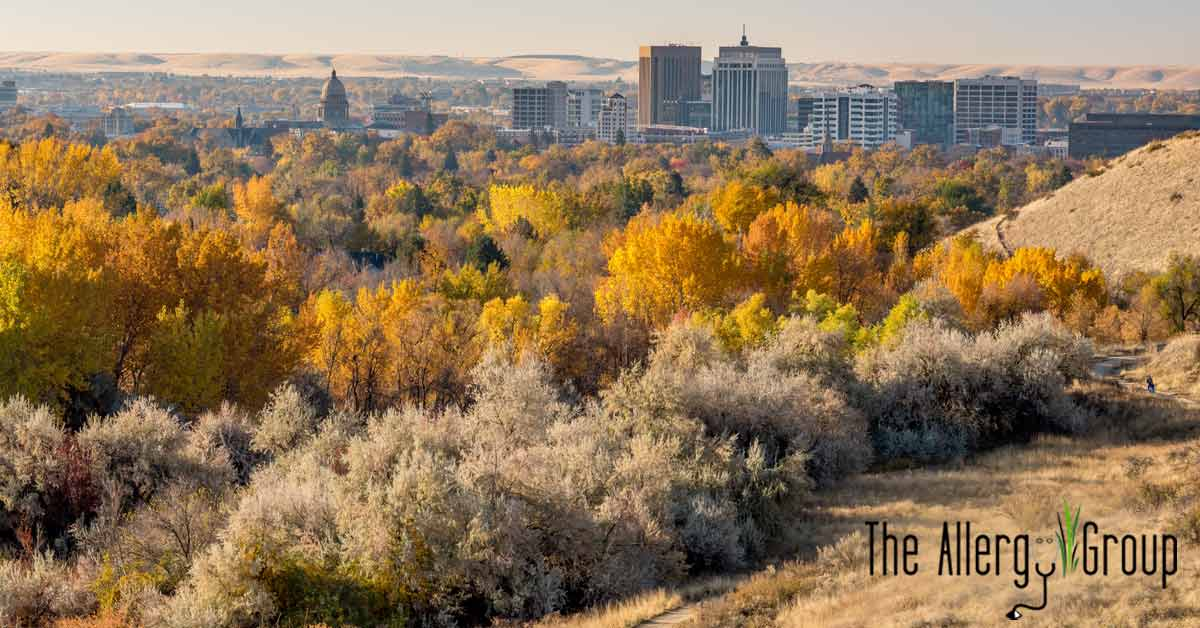
Fall Allergies in Boise, Idaho
You may hear more about tree pollen allergies during spring, but many people also suffer from fall allergies. One of the most prolific fall allergens is ragweed plants that only thrive for one season - but will pack a powerful punch of up to 1 billion pollen grains from a single plant . The chemicals that cause fall allergies start when your body's immune system is triggered to fight what it perceives as a foreign invader. The result is an oversupply of histamines being sent throughout the body, attempting to eject the invading pollen by sneezing, tearing up, coughing, or itching.
Instead of allowing your fall allergies to keep you inside, continue reading to learn how you can manage symptoms and reduce the occurrence of fall allergies.
Are Allergies Worse in the Fall in Boise?
Allergies can indeed become worse during autumn in Boise. The high amount of weeds from a healthy dose of Boise summer rain and sunshine can produce an over-abundance of plant pollen that will trigger an allergic reaction in some people. In Idaho, ragweed pollinates from August to early October. When you combine this with the annual release of mold spores released from decaying leaves and vegetation in the fall, you can see why fall allergy symptoms can spike.
If you or a family member suffers from asthma, you may notice increased difficulty with breathing during fall. The likely culprit may be a high mold particle count.
And finally, fall allergies can seem worse than spring or summer allergies because of the low humidity. The dryer fall air can trigger the same histamines in the nasal passages and lungs. The dry air works to dry out these mucous membranes which can lead to inflammation, stuffiness, or a runny nose.
Which Plants Cause Allergies in the Fall in Boise, Idaho?
For those who live in Boise, Idaho and surrounding communities, we get a double punch of fall allergens from vegetation. These include weeds, sagebrush, and chenopods such as tumbleweeds, pigweeds, beets, spinach, amaranth, quinoa and goosefoot. On top of reacting to a high weed population during the fall in, Boise allergy sufferers may also experience an allergic reaction to other plant life such as sunflowers, docks, sorrels, plantain, cosmos, grass, pine, and juniper.
One indicator of whether you will have a bad day due to fall allergies is to look for high allergy reports on your local weather. But often, the pollen count only makes the newsreel when it is extremely high.
A better way to track allergy levels in Boise, Idaho is to check a pollen count calendar. Here you will find a list of 100s of fall allergens with the current pollen and mold spore counts.
Fall Allergy Symptoms
- Hives, rash, or itchy skin
- Irritated or watery eyes
- Sneezing and/or runny nose
- Nasal congestion
- Itchy throat
- Headaches
- Difficulty breathing
How to Manage Fall Allergies in Boise, Idaho?
There is a treatment for fall allergies in Boise. Allergen Immunotherapy or allergy shots work to reduce your sensitivity to fall allergens. When a small amount of the allergen is introduced into the human body at regular intervals, the body can build up a tolerance to that allergen. Treatments may extend over years, so it is best to start as soon as your known allergen has been determined.
Allergy shots can reduce many of allergic reaction symptoms and can be administered to children over 5 years of age. Redness or swelling at the injection site are the most common side effects of allergy shots. Also, some patients may initially experience heightened allergy symptoms as the body works to build up a tolerance. But overall, patients experience an improvement over their allergy symptoms after the first year of treatment.
Make an Appointment at The Allergy Group
Looking for more information on how to manage your fall allergies? Visit our website to schedule an appointment with an allergist to learn if allergy shots are right for you. Our expertise in allergies makes us the perfect provider to help manage your seasonal allergies. We can test for your allergic triggers as well as provide information on prevention and prescribe treatments. This intervention can help improve your health and quality of life!

